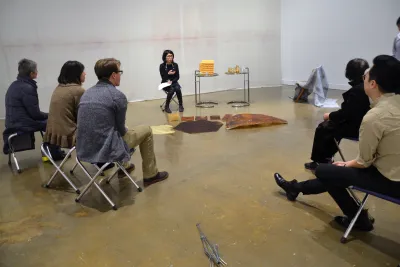Gallery talk as part of Gwenneth Boelens: At Odds at MIT List Visual Arts Center in 2017.
Catalyst Conversations: Confronting the Vacuum: Mark Pevsner and Melissa Franklin
Catalyst Conversations is pleased to bring together composer Mark Pevsner and Harvard physicist Melissa Franklin to discuss how ideas fulfill themselves out of emptiness.
Melissa Franklin investigates fundamental forces and elementary particles, with particular attention to fields. She contemplates the distinction between nothing and something. Pevsner structures his compositions against a backdrop of emptiness. His musical ideas, by creating their own language and vocabulary, are designed to coalesce into a “something”. Their conversation promises to be mind expanding and will feature a performance with Mark Pevsner, piano and Sonja Tengblad, soprano. Selections from Pevsner’s song cycle The Four Seasons will include the world premiere of Herbsttag. The conversation is followed by a reception in the Lower Atrium.
About the Speakers
Mark Pevsner lives in Boston where he composes and performs as a pianist. He received a Ph.D. in composition from Harvard University, where he studied with Leon Kirchner and Ivan Tcherepnin. Chamber compositions include Septet for Horn, Piano, and Strings, Trio for Violin, Viola and Piano, Elegy, Skopelos Partita, and For Two Pianos. His work-in-progress Die Brücke sets a one-page Kafka story for mixed chorus and large orchestra. This, in turn, has led to the recent song cycle The Four Seasons. In addition he has composed the music scores for the films Gate of Heavenly Peace (1996) and Morning Sun (2003). Mark has taught at Harvard University and has received awards from the National Endowment for the Arts and from Meet the Composer.
Melissa Franklin is the Mallinckrodt Professor of Physics at Harvard University. She is an experimental particle physicist who had worked on studies of hadron collisions produced by the Fermi National Accelerator Laboratory with the Collider Detector Facility (CDF) and the ATLAS experiment at the Large Hadron Collider (LHC). She worked in a collaboration of over 600 international physicists who discovered the top quark at CDF, and 3000 physicists on the ATLAS experiment who discovered the Higgs boson and where she studies particle interactions and symmetries at the highest energies now available worldwide. Professor Franklin received her B.Sc. from the University of Toronto and her Doctorate from Stanford University. She worked as a post-doctoral fellow at Lawrence Berkeley Lab, an assistant professor at the University of Illinois, Champagne/Urbana and was a Junior Fellow in the Society of Fellows at Harvard, before joining the Harvard faculty in 1989 and becoming the first female tenured faculty member in the department of physics in 1992 and the first female chair of the department in 2010.
Sonja Tengblad Commended by the Boston Globe for her “crystalline tone and graceful musicality”, soprano Sonja DuToit Tengblad is a versatile performer with credits spanning the Renaissance era through the most current composers of our time. Recent highlights include Monteverdi’s Il ritorno d’Ulisse in patria with Boston Baroque (as La Fortuna and Giunone), Handel’s Acis and Galatea with the Blue Hill Bach Festival (Galatea), appearances with the Handel and Haydn Society in Purcell’s King Arthur (Cupid) and Handel’s Samson (Israelite Woman), Knussen’s Symphony No. 2 for high soprano with the Boston Modern Orchestra Project, and her Carnegie Hall and Lincoln Center debuts, both with the New York City Chamber Orchestra. She was awarded 2nd place in the 2014 American Prize competition’s art song and oratorio division.
